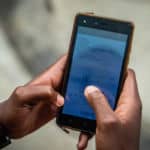Africa’s COVID-19 Moment: How Youth Startups Are Addressing the Pandemic – And What They Need to Reach the Next Level
Sub-Saharan Africa is home to the world’s youngest population, and one that is increasingly well-educated and teeming with innovative talent and entrepreneurial drive. Almost as soon as the COVID-19 alarm rang, long before African governments and their development partners realized it, Africa’s startups saw opportunities and sprang into action. While policymakers and donors were considering the procurement of hundreds of millions of dollars in medical supplies from around the world, and convening response consultations with high-level teams and experts, these young entrepreneurs were already addressing the pandemic’s effects on the ground.
Neither asked nor supported, African youth-led startups got busy repurposing their businesses or launching new operations to manufacture hand sanitizers, masks, shields and other protective gear. They innovated locally-made ventilators and testing kits, launched digital platforms for tracking and tracing transmission, built systems to inventory and deliver supplies, and designed apps to analyze patients’ symptoms, and to provide mental health services, food delivery, online education support, e-logistics and more.
Africa’s COVID-19 Moment
These efforts have been part of an unprecedented explosion in innovation and entrepreneurial energy across the continent. This is Africa’s COVID-19 moment. This generation of young African industrialists are devising homegrown solutions and applying their minds and hearts – they are not only passionate and compassionate, but also intentional about addressing societal failures.
This COVID-19 moment provides the development community a unique opportunity to jumpstart a new level of engagement with Africa’s startups. They don’t want handouts or traditional aid from governments or donors. Rather, they want investment, access to markets, relationships with like-minded partners, and the removal of policy and regulatory hurdles.
Earlier this month, UNDP’s Regional Bureau for Africa and blueMoon, Ethiopia’s top youth business incubator, organized an event where we had the opportunity to listen firsthand to four visionary young African entrepreneurs describing their work on COVID-19. Below, we’ll share some of the ways they’re embracing the challenges and opportunities presented by the pandemic, and their thoughts on the value of local solutions to the crisis.
Insights from Young African Entrepreneurs
Mike Endale, Principal at BLEN Corp, an information technology firm located in Washington D.C., is an Ethiopian based in the United States who spearheads the Ethio-COVID-19 Emergency Tech Volunteer Task Team to support Ethiopia’s Ministry of Health. The team is independent from the Ministry of Health and from Endale’s private enterprises, but it allows him to leverage his professional and technical skills to provide resources for other social entrepreneurs to use. Over the past 10 weeks, these efforts have drawn a volunteer team of over 1,700 software engineers, which has produced an open source Africa COVID-19 Response Toolkit. Though these tools were initially developed for Ethiopia’s context, the action-oriented dashboard is adaptable to any government or public entity involved in COVID-19. His solutions have been featured by Harvard University’s Global Health Institute and MIT. Endale summed up the situation facing the continent’s young businesses: “With local solutions designed for Africa by Africa’s own children, the future is bright, and this pandemic provides a chance for realignment.”
Daniel Ndima is the CEO of CapeBio Technologies in South Africa, an applied genomics company that focuses on innovative bio-discovery research, which he founded in 2018. When COVID-19 struck, CapeBio quickly developed a qPCR COVID-19 test kit that produces results in just 65 minutes using a local flora-based reagent. The test kit is under validation phase, with regulatory review pending in South Africa. As Ndima put it, “We have to believe in our own scientists. We don’t have to automatically look to the West for solutions.”
Nigerian entrepreneur Temie Giwa-Tubosun founded LifeBank to improve access to blood transfusions. Since 2016, LifeBank has moved 22,830 units of blood to more than 25 hospitals and screening centers in Nigeria, while also running blood drives and connecting donors to blood banks. In March, the company quickly pivoted to building a data platform to track the number of ventilators, ICU beds and respirators available in private hospitals and health centers in Nigeria. It also started conducting drive-through COVID-19 testing, and supplying oxygen to health centers, and it is now expanding to Kenya and Ethiopia. She advised aspiring entrepreneurs to “approach innovation not as building versions of what is available in the West but to solving local problems. Figure out which problems make your heart sing and then look at how to scale up.”
Jennet Lemma is an MD and founder of Gaber Garment, a garment manufacturing social enterprise dedicated to empowering women in Ethiopia. A returnee from the United States, she repurposed her garment factory in April to produce face masks and protective gear. She has retained jobs for all of her 75 employees, mostly women, despite the economic downturn caused by the pandemic. She emphasized that “the collateral requirement for loans makes it difficult for SMEs to scale. Instead of importing hundreds of millions of masks, why not make it easier for us to supply locally?”
Four Ways to Support Africa’s Youth Startups
We are deeply inspired by this generation of committed young Africans, and their focus not only on local impact, but on being global citizens. These four represent a new movement of youth industrialists that is gaining momentum across the continent – from Cape Town to Cairo. The question is not whether Africa has innovation and entrepreneurial talent, but what the continent is going to do with it – and how the global development community can support it.
We see four critical interventions for the global development community to prioritize. The first is to mobilize awareness and create momentum for governments and partners to better grasp this opportunity to foster more startups. We must also create platforms that enable burgeoning entrepreneurs to network, learn and forge partnerships, such as the Tony Elumelu Foundation-UNDP Entrepreneurship Programme and YouthConnekt. We must unlock financing specifically designed for African startups. And finally, we must break down the regulatory, policy and cultural fences that prevent youth-led businesses from starting and scaling up.
In a post-COVID-19 world, we do not want African businesses to go back to normal. For countless youth entrepreneurs, “normal” meant inequality, unsustainability and a lack of resilience. We need to build a “new normal” – a better Africa where young industrialists lead, and the continent turns its demographic dividend into a key enabler of progress.
Ahunna Eziakonwa is Assistant Secretary General, Assistant Administrator and Director, UNDP Regional Bureau for Africa (RBA). Dr. Eleni Gabre-Madhin is chief happiness officer of blueMoon in Ethiopia and is a member of UNDP’s African Influencers for Development (AI4Dev) group.
Photo courtesy of Exchanges Photos.
- Categories
- Coronavirus, Investing



